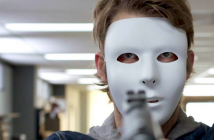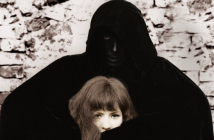
Cast: Chris Lowell, Allison Janney, Clark Gregg
Director: Maggie Kiley
Country: USA
Genre: Comedy | Drama | Romance
Editor’s Notes: Brightest Star opens in limited release this Friday, January 31st.
It is hard not to become a bit desensitized to romance as it plays on the big screen. Heaps of films have taught us what to expect from our cinematic couples and how things will wind up right before those credits roll. More recently some films have looked to challenge the happy ending status quo, but even this field of sensitive loners and “right guys” has become crowded. Brightest Star tries to introduce a new take on the maintenance of hopeful love and lost discovery, but is so populated with the generally familiar that it is gratingly, rather than pleasantly, forgettable.
The film introduces a sensitive and romantic boy (Chris Lowell) in his freshman year of college. Quietly sulking in his Astronomy 101 class he is captivated by the beautiful Charlotte (Rose McIver) from the moment she enters the room. The class fades into the background as she becomes his primary focus. As time goes on, he manages to win her over and falls into a relationship overflowing with soft kisses and contemplative gazes. However, like many relationships tend to, it fizzles and the boy is left lost, abandoned in the apartment that they once shared. The boy sets out on a quest to win Charlotte back, before realizing that what he really needs is to find himself.
The film lacks confidence of vision, resulting in astounding pacing issues. Its basic structure is simple; however it has a difficult time establishing a forward momentum and instead, like its main character, is often left just spinning its wheels.
We don’t always need to like our main character. The members of the audience recognize their own flawed tendencies and the introduction of a person of similar damage can often make the protagonist all the more relatable. However in Brightest Star, there is a disconnect between what is implied and what is delivered. The boy’s description is achingly stock: wandering loner with shy sensibilities but strong romantic tendencies. Throughout the film, one would hope for some deeper development to push him past these very basics, but director Maggie Kiley never offers this up. As soon as we are told that he loves Charlotte, the character development has finished. By not crafting the character carefully, we cannot fully buy-in to his unending love for her. Many of his actions, which are intended as sweetly awkward, hew much closer to that of a menacing stalker. In fact, had the accompanying score been more melodramatic and populated with copious dark ominous tones, it would feel right at home on Lifetime recounting a generic female’s struggle with her murderous spurned ex-lover. This problem of lacking character development is rampant throughout the film. Characters are introduced quickly and then never fully explored, even now it is difficult to remember specific character names or how they contribute to the film as a whole. This is a film that requires the viewer to at least understand, if not empathize with, someone on screen; but the characters’ two-dimensionality restricts them from appearing as true people.

The film lacks confidence of vision, resulting in astounding pacing issues. Its basic structure is simple; however it has a difficult time establishing a forward momentum and instead, like its main character, is often left just spinning its wheels. Appropriately, as the film deals with the boy’s inability to grow up, the main character repeats the same mistakes frequently. The problem is not this repetition but the absence of anything else and furthermore a lack of reasoning for his persistence to avoid addressing his shifting world. Where the repetition should strengthen the film’s central message, it instead constructs an awfully dull atmosphere, one ruled by an unlikable and occasionally mean dictator. The frustrating repetition, inexplicably jumping timeline and overall lack of motivation not only make the film difficult to consume but contributes to an ending that feels absolutely rushed and completely unfulfilling. If the lack of a worthwhile viewing experience weren’t enough, the terrible pacing issues make the film’s meager runtime, already less than 90 minutes, feel egregiously overlong.
In hopes of lending their themes a greater weight, writers Maggie Kiley and Matthew Mullen rely on some basics of astronomy as a tool for thematic growth, a move that ends up backfiring.
In hopes of lending their themes a greater weight, writers Maggie Kiley and Matthew Mullen rely on some basics of astronomy as a tool for thematic growth, a move that ends up backfiring. I see that your central couple meets in astronomy class and for a hot second the lead even shows a renewed and vigorous interest in this freshman elective, however this does not justify the bookending of the film with pretentiously heavy-handed ruminations on how romance is like the skies above us. It’s a choice that merits more eye rolls than introspective contemplation. Additionally, the filmmakers have a tough time sticking with the astronomy theme alone, shoehorning in some baseball imagery that, and I’m sorry for this, doesn’t even have the courtesy of flying foul before striking out.
The film is crippled by its lack of character development, making the story and the associated actions unendingly false. There is a morsel of a good film here, the acting is serviceable, with Allison Janney in particular accomplishing more with her limited screen time than the rest of the film manages, and the central concept is intriguing on its own. However, even at its short runtime, it is stretched far too thin to be considered successful. The dialogue is groan inducing and riddled with clichés, while the story lacks propulsion or basic authenticity. The understanding of relationships contained within the film is juvenile and even fails to adequately depict tangible ideas of growing up. Brightest Star’s main character is a hopeless romantic that is left broken by the ending of a relationship and as a result finds himself wandering, lost in the real world. Like its main character, the film is also hopeless and spends a great deal of time wandering, struggling to find the real world. At its best, Brightest Star is a CW series on fast forward and that just might be unfair to the CW.
[notification type=”star”]42/100 ~ BAD. Brightest Star tries to introduce a new take on the maintenance of hopeful love and lost discovery, but is so populated with the generally familiar that it is gratingly, rather than pleasantly, forgettable.[/notification]



